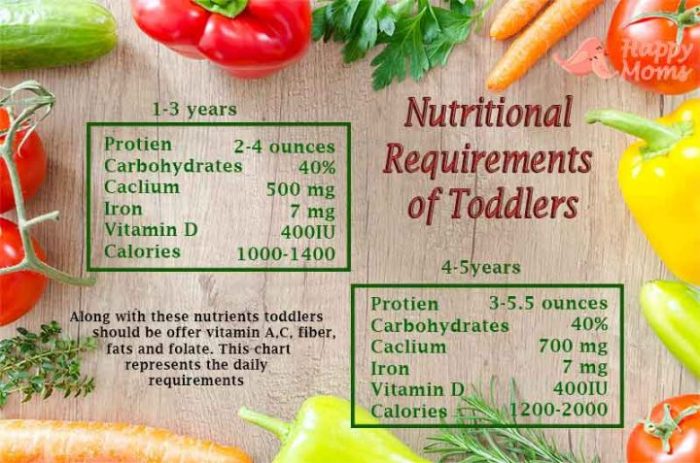
Exploring the essential nutritional needs for healthy growth in toddlers unveils a world of intricate details crucial for their development. Join us on this enlightening journey as we delve into the key nutrients, portion sizes, and meal frequencies vital for nurturing thriving toddlers.
Dive into the realm of toddler nutrition and unlock the secrets to fostering optimal growth and well-being in these young individuals.
Nutritional Needs for Healthy Growth in Toddlers
Proper nutrition is crucial for the healthy growth and development of toddlers. A balanced diet ensures that toddlers receive the essential nutrients they need for optimal growth and overall well-being.
Key Nutrients for Toddlers’ Development
Toddlers require a variety of nutrients to support their growth and development. Some key nutrients include:
- Proteins: Essential for building and repairing tissues, proteins are crucial for muscle development and overall growth.
- Carbohydrates: A primary source of energy, carbohydrates provide fuel for toddlers’ activities and growth.
- Fats: Important for brain development and absorption of fat-soluble vitamins, healthy fats are essential for toddlers’ growth.
- Vitamins: Play a vital role in various bodily functions, such as immune system support, bone health, and overall growth.
- Minerals: Essential for maintaining proper bodily functions and supporting growth, minerals like calcium, iron, and zinc are key for toddlers’ development.
Portion Sizes and Meal Frequency
It is important to offer toddlers appropriately sized portions of food to meet their nutritional needs without overfeeding. Additionally, toddlers should have regular meals and snacks throughout the day to ensure they receive a consistent intake of nutrients for growth and energy.
Child Health

Proper nutrition plays a crucial role in the overall health and well-being of toddlers. When children do not receive the necessary nutrients, it can lead to various health issues that can impact their growth and development.
Common Health Issues in Toddlers Related to Nutrition
- Iron deficiency anemia: Lack of iron in the diet can lead to fatigue, weakness, and developmental delays.
- Vitamin D deficiency: Insufficient vitamin D intake can result in poor bone health and weakened immune system.
- Obesity: Overconsumption of unhealthy foods high in sugar and fats can lead to obesity and related health problems.
- Poor immune function: Inadequate intake of essential nutrients can weaken the immune system, making toddlers more susceptible to infections.
Impact of Poor Nutrition on a Child’s Growth and Development
Poor nutrition can hinder a child’s physical and cognitive development. It can lead to stunted growth, delayed milestones, and learning difficulties. Additionally, inadequate nutrition can increase the risk of chronic diseases later in life.
Tips for Promoting Healthy Eating Habits in Toddlers
- Offer a variety of nutrient-dense foods such as fruits, vegetables, whole grains, and lean proteins.
- Limit sugary and processed foods to prevent empty calorie consumption.
- Involve toddlers in meal planning and preparation to encourage healthy eating habits.
- Set a positive example by making healthy food choices yourself.
Significance of Regular Health Check-ups for Monitoring a Child’s Growth
Regular health check-ups are essential for monitoring a child’s growth and development. Healthcare professionals can track a toddler’s height, weight, and overall health status to identify any nutritional deficiencies or growth issues early on. These check-ups also provide an opportunity to discuss any concerns or questions regarding the child’s nutrition and well-being.
Last Recap

In conclusion, understanding and meeting the nutritional needs of toddlers is paramount for their overall health and development. By prioritizing a balanced diet and healthy eating habits, we pave the way for a bright and robust future for our little ones.
Let’s continue to nurture and support their growth journey with knowledge and care.
FAQ
What are some key nutrients essential for toddlers’ development?
Key nutrients for toddlers include calcium, iron, vitamin D, and omega-3 fatty acids for healthy growth and development.
How can poor nutrition impact a child’s growth and development?
Poor nutrition can lead to stunted growth, weakened immune system, and cognitive impairments in children.
What are the recommended portion sizes and meal frequencies for toddlers?
Portion sizes for toddlers should be small and frequent, with three main meals and 2-3 healthy snacks throughout the day.





